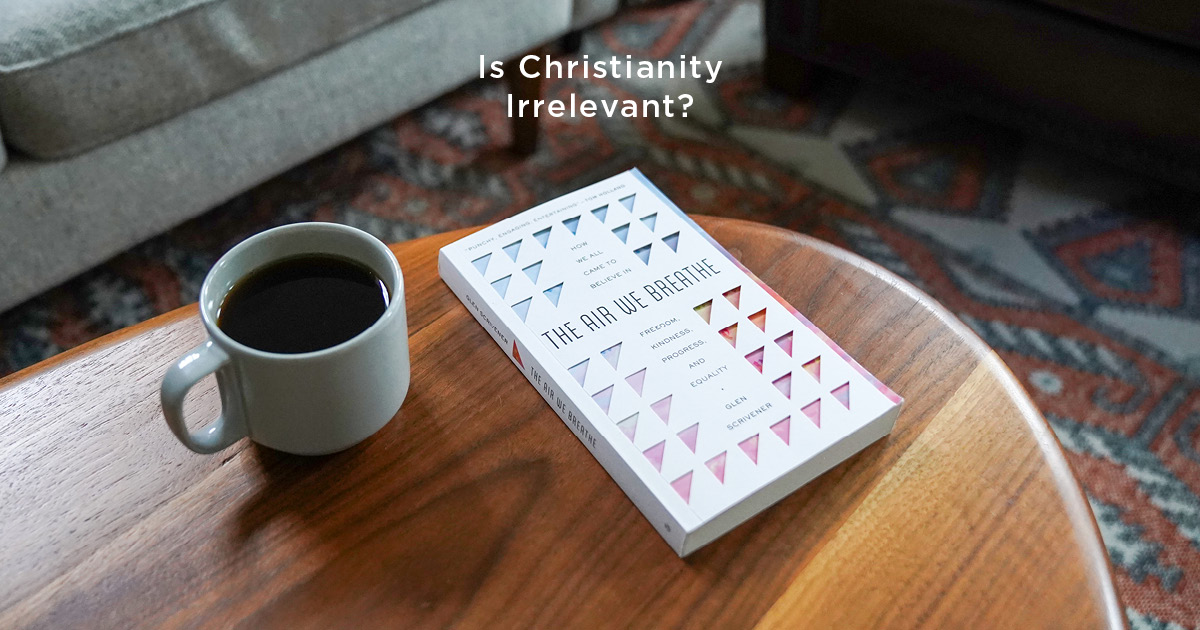
This is an excerpt from Glen Scrivener's The Air We Breathe, which argues that the crucial values of Western culture, such as freedom, kindness, progress and equality, are rooted in the Christian Revolution.
Goldfish see what’s in the water, they see what’s refracted through the water, but I assume (I haven’t done the proper investigations) that goldfish don’t see the water itself. And yet there it is. It’s their environment. Universal but invisible. It shapes everything they do and everything they see. But they don’t see it.
Here’s the contention of my new book: if you’re a Westerner—whether you’ve stepped foot inside a church or not, whether you’ve clapped eyes on a Bible or not, whether you consider yourself an atheist, pagan or Jedi Knight—you are a goldfish, and Christianity is the water in which you swim.
Or, to say the same thing in a slightly different way, Christianity is the air we breathe. It is our atmosphere. It’s our environment, both unseen and all-pervasive. And in the tradition of a spiritual teacher, I’m going to ask you to focus on your breathing. This is a technique common to so many of the great religious traditions.
Our problems with Christianity (and we all have problems with it, especially Christians!) turn out to be Christian problems.
The spiritual teacher does not invite you to start breathing. You’ve got that life skill down pat—20,000 breaths a day; you’re a natural! But there’s something centering about noticing your breathing. Are you doing it now? Suddenly you’re slowed down. You’re aware of your dependence. You’re inhabiting your body as a creature with needs and rhythms and physicality. You are mindful of your connection to the world around you and your place within it.
My new book is like that practice. But instead of oxygen, I’m talking about beliefs and intuitions. What I want you to do is notice your dependence on the environment around you and your place within the world of ideas. Here’s a chance to slow down and pay attention to the profoundly Christian atmosphere you inhabit.
Goldfish might not know the chemical composition of H20, but it’s still central to their lives. In the same way, I’m guessing that the following resonate with you:
Equality: We believe in the equal moral status of every member of the human family, no matter their rank, race, religion, gender or sexuality.
Compassion: We believe a society should be judged by the way it treats its weakest members.
Consent: We believe that the powerful have no right to force themselves on others.
Enlightenment: We believe in education for all and its power to transform a society.
Science: We believe in science: its ability to help us understand the world and improve our lives.
Freedom: We believe that persons are not property and that each of us should be in control of our own lives.
Progress: We believe in moral improvement over time and that we should continue to reform society of its former evils.
None of these values are self-evident, nor are they widespread among the civilizations of the world. So where did they come from, and how did they get to become “the air we breathe”?
We might feel that Christianity is unequal, cruel, coercive, ignorant, anti-science, restrictive or backwards. That is, in fact, a pretty common list of objections to the Christian faith, and, at points, the shoe fits. But I didn’t pick those seven objections at random. I simply reversed the seven core values at the heart of this book.
Discover how the teachings of Jesus not only turned the ancient world upside down, but continue to underpin the way we think of life, worth, and meaning.
The reason why those seven accusations bite is because, deep down, we believe in the seven values. Our problems with Christianity (and we all have problems with it, especially Christians!) turn out to be Christian problems. Like air, Christianity is so pervasive that we cannot help depending on it, even as we protest against it.
Whether you are a Christian or not, journey with me from the ancient world to the modern and from the beginning of the Bible to the end of history. You’ll discover how the teachings of Jesus not only turned the ancient world upside down, but continue to underpin the way we think of life, worth, and meaning.
In Jesus our lives, our beliefs, our practices and our world make sense.